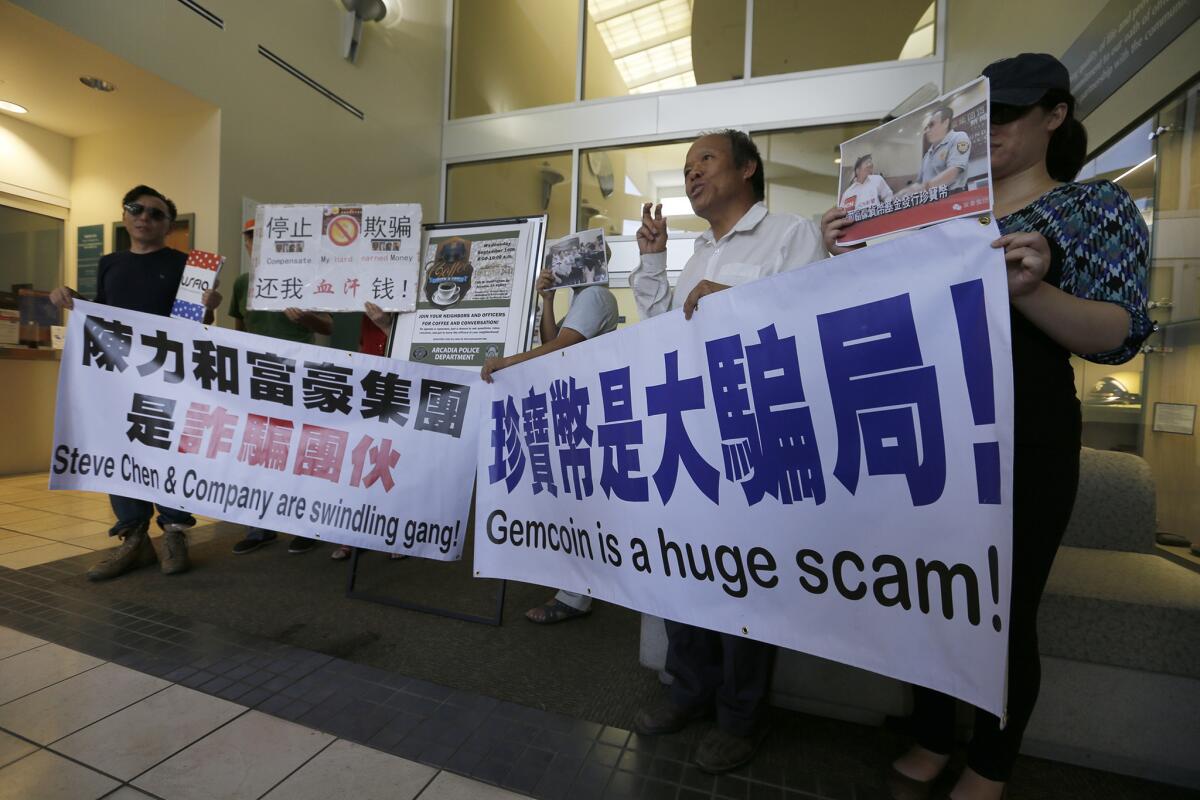Federal authorities raid Gemcoin, a digital currency company accused of fraud

As they file reports with Arcadia police on Sept. 10, Michael Liu, second from right, and other Gemcoin investors hold banners warning potential investors.
- Share via
Federal authorities have raided the offices of Gemcoin, a digital currency company based in Arcadia that’s accused of bilking about $32 million from Chinese and U.S. investors.
The raid on Tuesday, in which authorities removed computers and boxes of evidence and locked the doors of the firm, comes on the heels of a Securities and Exchange Commission complaint filed in federal court last week that accused company founder Steve Chen of running a pyramid scheme.
The complaint said thousands of investors were lured with false claims about Gemcoin, which was purportedly backed by large holdings in Dominican amber mines.
On Monday, the SEC also obtained a court order to freeze the assets of 48 bank accounts associated with Chen and 13 companies he controls, including USFIA, the company promoting Gemcoin.
Earlier this month, according to the filing, Chen attempted to wire $7.5 million out of USFIA’s account at Bank of America to a Chinese bank after he was interviewed by the Arcadia Police Department about a separate case involving alleged death threats against disgruntled Gemcoin investors.
USFIA, which was repeatedly endorsed by Arcadia City Councilman John Wuo, is under investigation by the FBI, according to documents reviewed by The Times.
Wuo has denied any association with the company despite appearing on multiple promotional brochures and in YouTube videos in which he calls Gemcoin a “breakthrough in finance.”
Wuo, who is also listed as a partner in a separate entity that shares a business address with USFIA, was not named in the complaint.
Arcadia residents have called for his resignation, and some community groups are gathering signatures for a possible recall effort. Wuo did not respond to requests for comment.
The SEC is accusing Chen and USFIA of committing securities fraud, selling illegal and unregistered securities and misleading investors and misusing their money. USFIA and Gemcoin are “nothing more than a pyramid scheme,” where the only revenue comes from recruiting new investors, according to the complaint.
On promotional videos, websites, presentations and brochures in multiple languages, Gemcoin is represented as a virtual currency that is an improvement on Bitcoin. Some websites claim that the value of Gemcoins have increased by more than 500% since the currency was issued.
USFIA has raised about $32 million from investors since 2013, according to the complaint. Nearly $19 million of that came from foreign investors, with $5.7 million coming from checks mostly issued by domestic investors, it said.
The company’s bank accounts show no apparent revenue over that period, the complaint said. Instead, recorded transactions show large withdrawals to purchase luxury automobiles, entertainment and travel, as well as several transactions with various companies controlled by Chen.
Chen and the promotional materials his companies created made “outlandish statements” to encourage investors to buy Gemcoins and burnish Chen’ s business and political credentials, the complaint said.
Chen claimed he was a founder of China Unicom, a state-owned Chinese telecommunications company, as well as an undersecretary to a high-ranking Communist Party official. USFIA planned to open 3,000 coffee shops within three years, and said it owned 70% of the Dominican Republic’s amber mines and held $50 billion in assets worldwide.
Chen and others acting on his behalf also claimed that the U.S. government had already purchased 70% of the Gemcoins in circulation, according to the complaint. USFIA promotional materials guaranteed a 6,400% profit and claimed it was impossible for Gemcoin investors to lose money.
The assets of Chen and the 13 companies named as defendants have been placed under the control of a court-appointed receiver.
A group of disgruntled investors are planning to file a civil suit against Chen and USFIA sometime next week, said Long Liu, their attorney.
“The raid was a big first step,” Liu said.
More to Read
Sign up for Essential California
The most important California stories and recommendations in your inbox every morning.
You may occasionally receive promotional content from the Los Angeles Times.














